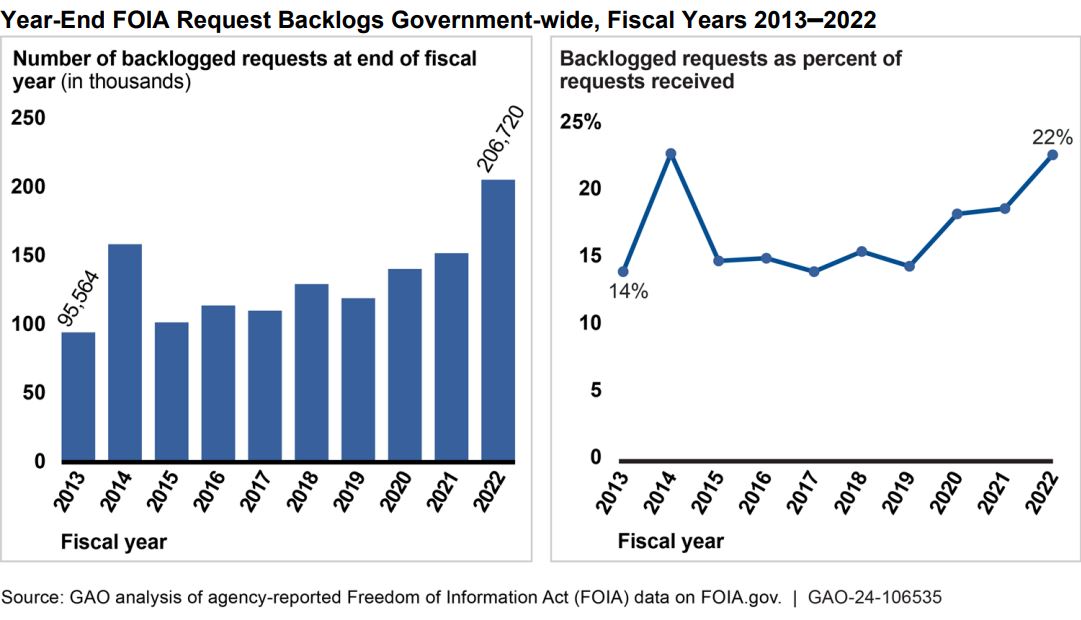During Sunshine Week, GAO finds agencies need better plans to address surging FOIA backlogs
FOIA backlogs have been on the rise across government for the past decade, but many agencies lack detailed goals and milestones to reduce the backlogs.
The Justice Department is developing new Freedom of Information Act guidance to ensure agencies have adequate plans to address mounting FOIA backlogs across government.
Even though FOIA backlogs have been on the rise since 2012, many agencies lack detailed goals and milestones for addressing the logjam of requests, according to a Government Accountability Office report released this week. Agencies are generally required to process FOIA requests within 20 days, and a request is considered backlog when it takes longer than the required time.
Out of 14 agencies directed to develop plans in 2023, only two includes goals and none included any timelines for carrying out their actions, GAO’s report found. The auditors noted the backlogs have led to extended wait times for public records requests. The governmentwide FOIA backlog sits at more than 200,000 cases.
“FOIA is a critical tool for members of the public to access information about the federal government’s actions and decisions,” the report states. “However, the persistent and growing government-wide request backlog undermines transparency and accountability.”

The auditor recommended DoJ’s Office of Information Policy (OIP), which oversees FOIA across government, develop new guidance to ensure FOIA backlog reduction plans include clear goals, milestones and timelines.
“Including such information in backlog reduction plans along with, as necessary, planned actions to allocate staff with needed skills, could help ensure that backlogs are addressed,” GAO’s report states.
In response to the report, OIP staff told the auditors they recently directed select DoJ components develop plans that outline new actions they will take to reduce backlogs to fiscal 2018 levels.
Now, OIP staff is developing guidance for all agencies in 2024 on “how to develop and implement an effective backlog reduction plan,” GAO’s report states.
Staffing FOIA offices has been a particular challenge for many agencies. The FOIA Advisory Committee is advancing new recommendations that would suggest the Office of Personnel Management grant agencies direct-hire authority to quickly fill FOIA positions.
The GAO report noted the staffing issues as well, and suggested OIP ensure agencies are detailing personnel needs in their backlog reduction plans.
“Advising agencies to conduct a similar evaluation to identify the staff resources needed to support backlog reduction efforts outlined in their plans could help ensure agencies allocate the staff needed to implement such efforts,” GAO’s report states.
FOIA data reliability issues
GAO’s report also found issues with the reliability of average FOIA processing times reported by some agencies. In some cases, agencies were reporting an unweighted average when they were required to report a weighted average.
“For one agency, doing so understated the number of days it took to process its complex requests by about 10 percent,” GAO’s report states. “For the other two agencies, reporting the unweighted average overstated the number of days it took to process their complex requests by about 40 percent.”
Several lawmakers, both Democrat and Republican, responded to GAO’s recent FOIA report. Rep. Jamie Raskin (D-Md.) said the report “not only outlines the key challenges that agencies face in their efforts to process FOIA requests in a timely manner, but it also highlights a pathway to transparency and regaining public trust in our institutions.”
“Congress must ensure agencies have the resources needed to live up to FOIA’s promise,” Raskin added.
Sen. John Cornyn (R-Texas) said report “should serve as a starting point to reduce the backlog of FOIA requests so Americans can continue to hold those who represent them accountable.”
Copyright © 2025 Federal News Network. All rights reserved. This website is not intended for users located within the European Economic Area.
Follow @jdoubledayWFED






